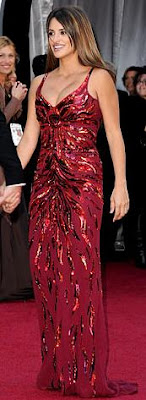
At first glance I was so disappointed with Lawrence's look. She had been so flawless and risky all season long, wearing bold colors in even bolder designs (girl's got the legs) so when she showed up in this simple red column with practically no accessories and free flowing hair I was like "what?".
As the night went by however, she looked just radiant! The silhouette is perfection and unlike other actresses, she never looked constricted or restrained by what she was wearing. Can't wait to see what she comes up with next!
9. Sandra Bullock in Vera Wang
This is how it's done Anne Hathaway's Valentino (I felt terrible typing that by the way...Annie knows I worship her)

8. Natalie Portman in Rodarte
The Best Actress winner was the image of pure joy and her simple fashion choice proved to be flawless. I'm not sure what everyone was expecting of her given that she's pregnant and all which must make dress choices much more difficult.
However the color was stunning (anyone else had flashbacks of Keira Knightley in 2006?), the hair was lovely and she accessorized like a pro.
Va-va-voom Miss Hudson! The Oscar winner looks absolutely hawt in this orange Versace.
See how her dress is a bit of Sandra Bullock's and Gwyneth's all rolled into one bomb of sexiness.
The accessories are perfect, the hair is incredible and you just gotta love the boobs. Beyoncé's "style" must be rolling in its grave of tackiness.
6. Anne Hathaway in Givenchy Couture.
Anne changed dresses a LOT and while some weren't fully successful (that weird Tom Ford from the end) this vanilla construction was a delight.
The bodice recalls the Versace January Jones wore to the Emmys once but while Jones is all about the cutting edge, Annie fits more of a princess mold.
This dress was shown on the runway as a wedding dress and Hathaway makes it look positively regal.
The Oscar winner/country singer was stunning in this metallic CK column. She let her hair down and in all honesty looked like what Oscar would look like if he was a gorgeous woman.
The Louis Vuitton brooch was a bit off putting though, it was one of those situations when you like and then hate something. Good that you almost can't see it!

4. Anne Hathaway in Atelier Versace.
See what I meant about the Givenchy looking like Versace?
This is the kind of dress the house of Donatella is magnificent at: simple, sexy and delicately elaborate gowns that look as comfortable as shorts with the grace of couture mortals can't afford.

3. Anne Hathaway in Oscar de la Renta.
Disco was back for a few seconds as Anne rocked the stage in this beaded Oscar de la Renta which could do flashy nice things and made her look more beautiful than she did all night long (although it must be said she was all sorts of stunning in her masculine tux as well...)
As you know, I've had a love/hate relationship with Kunis' red carpet choices. Sometimes she looks stunning but more often than not she looks like she's trying too hard.
This lavender Ellie Saab was wonderful. Notice the gorgeous lace details on her cleavage and the way in which the dress flowed making her look radiant and quite sexy.
She was classic Hollywood with a slight edge and all throughout the night I kept telling myself "this is the classy version of this".
My prediction was right. This woman is a goddess among stylish women. The truth is her dress couldn't be more simple if it tried but it's such a well designed gown that like Cate's work, you find yourself uncovering layers and layers of what makes it so wonderful.
For starters the color! This delicate mix of lavender, violet and white makes for a warm look that's also aggressively imposing.
Next, that flowered frame is a thing of real beauty. It's sexy withou being vulgar (like ScarJo's back window) and reminds us that we are indeed watching a lady.
The yellow details on the shoulders accentuate her tasteful earrings and the simple bracelet completes the look. Also, Cate's hair has grown into something absolutely stunning. If this was a better world it would be her and not Jennifer Aniston who'd inspire fashion choices the world over.
Some have complained that the dress is a bit too weird and pastoral, when it's actually evoking and utterly magical.
So Luke, agree or disagree? Who would you add or remove? And the rest of you guys, get out your inner fashionista and let's discuss this! After all we know the clothes are usually better than the Oscars themselves right?






































 As if trying to recreate the strange lyrical romanticism he achieved with The Crying Game, Neil Jordan tackles on something more mythological in Ondine: a tale of a fisherman named Syracuse (Farrell) who catches a mysterious young woman (Bachleda) with his fishing net.
As if trying to recreate the strange lyrical romanticism he achieved with The Crying Game, Neil Jordan tackles on something more mythological in Ondine: a tale of a fisherman named Syracuse (Farrell) who catches a mysterious young woman (Bachleda) with his fishing net.